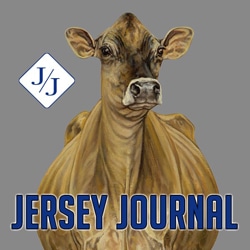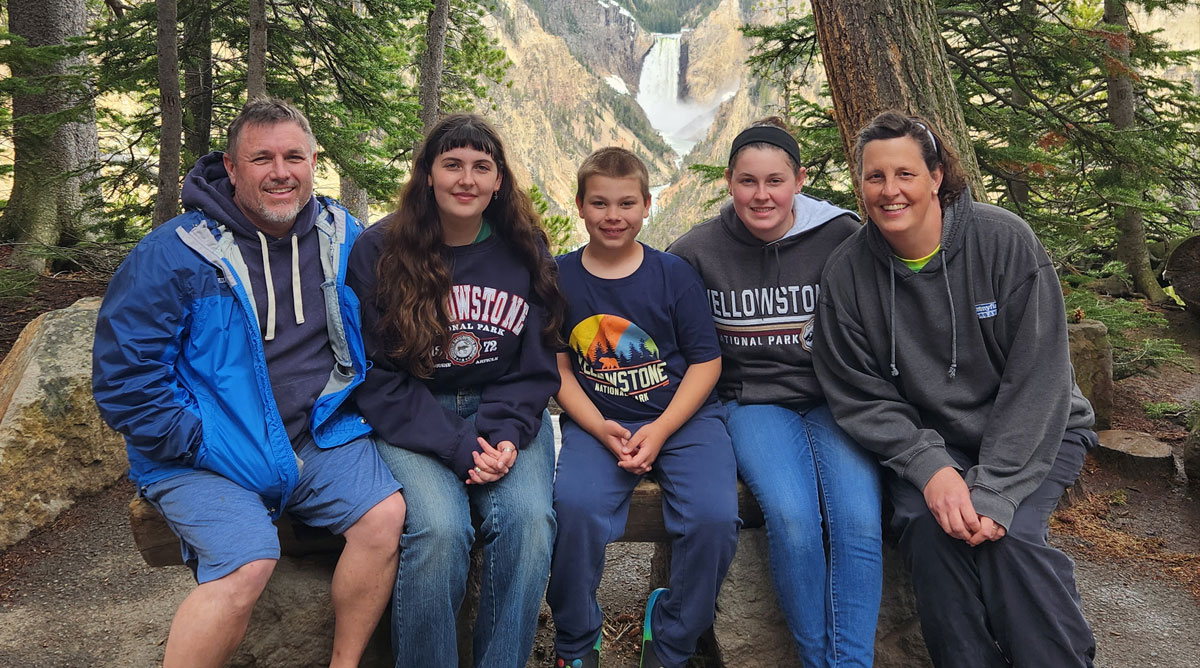Getting to Know AJCA Director Jason Johnson
Jason Johnson, Northwood, N.H., is serving his second term as Director of the First District of the American Jersey Cattle Association (AJCA). He was elected to serve his first term in 2021 and his second in 2024. With the redistricting that will occur in 2025, he will continue to represent an area identified as District 1 and serve through elections of 2026
He is currently serving on the Development and Information Technology and Identification Committees and the All American Open Show Committee. He has also sat on the All American Sale Committee.
A fourth-generation dairy farmer, Jason grew up in New Hampshire and earned a dairy management degree from the University of New Hampshire in 1996. He has managed dairies in several states and two countries and is currently the associate director of the organic farm program at Lactalis U.S. Yogurt (LUSY).
He and his wife, Heather, and children, Regan, Ryleigh and Asher, raise a few milk cows and bred heifers and care for a small flock of chickens at the home farm in Northwood.
Jason is a director for the National Dairy Shrine and vice president of the New England Jersey Breeders Association. He has served the Vermont Jersey Breeders Association as president, vice president and director. In 2015, he received the A.C. “Whitie” Thompson Memorial Award at World Dairy Expo.
The Jersey Journal visited with Jason about his dairy industry experience and his service on the AJCA board.
Describe your dairy activities as a young person. What were your early aspirations for a career?
For me, 4-H is really where it all began, with a special person named Becky Colby, who helped me get started with showing. She was in her 20s when I was a kid but took time to invest in me and get me going in the show ring. Once I got a bit older, judging piqued my interest in 4-H and college. At that point, however, I was going to be a teacher and was not really interested in a career in dairy. That changed when I realized I did not have the patience to teach junior high or high school.
What herds have you managed in your career?
- Crasdale Farms, Prince Edward Island, Canada.
- Absolute Holsteins and Jerseys: our farm in Forestville, Wis.
- Billings Farm, Woodstock, Vt.
- Mapleline Jerseys, Hadley, Mass.
- Johnsonacres: our farm in Northwood, N.H.
Having managed dairies in two countries and four states, what is similar across each operation?
Well, good cows are good cows, no matter the breed, the state, or the country. But certainly, I had the opportunity in every operation to take cows to the next level. I worked with owners who were willing to invest in great genetics knowing that livestock investments don’t always pan out. Outside Mapleline Jerseys, owned by John Kokoski and his family, all were tiestall facilities. When I left their farm, I was just on the cusp of the technological revolution in dairy, something I would have liked to experience while managing cows. But I am super excited I get to see our producers, even in the organic space, embrace and thrive with these tools.
What did you learn new or different at each one?
At Crasdale Farms, I learned so much about fitting cattle and exhibiting at national shows. At my own place in Wisconsin, I learned how to run a business (sometimes the school of hard knocks). At Billings Farm, I learned all about cheese and started a value-added dairy business to diversify. Here I also learned how to deal with 60,000 visitors a year, mostly nice. In every operation I have seen how diversification is key to success.
Describe your responsibilities with your current employer.
Currently I serve as the associate director of the organic farm program for LUSY. My primary responsibility is to lead a team responsible for all things related to the direct supply, from payroll to procurement to milk quality to sustainability initiatives. I also serve on the global corporate social responsibility working group for Lactalis Group, our parent company, which is now the largest dairy company in the world. This has given me the opportunity to travel internationally a bit as well.
How has your experience directly “on the farm” helped you do your job now “off the farm?”
It has really given me an unbelievable advantage to connect with producers. I was there once, and hope I bring credibility to the relationship piece of processor-producer interactions. I really try to balance the benefits for both the producer and the private processor. The most enjoyable thing for me is to connect customers and consumers with dairy producers at the farm.
Why did you decide to serve on the AJCA board? IE what motivated you to run for office?
I just wanted to give back. If I can help to serve the organization that motivated me as a young dairy person, that is a win for me.
How does your current job help you serve on the AJCA board?
I certainly get to see the industry from the 50,000-foot level. There is way too much information most of the time, but the global connections help keep the big picture on the forefront. We always need to be willing to embrace change. I see that every day in my work in the dairy industry. I think we need to remember that as an organization.
Are there certain initiatives that you have been particularly passionate about during your board tenure?
I think keeping our focus on youth is critical. Without the next generation, the organization will not be able to sustain itself and thrive. The restructuring of the AJCA Districts and looking at the big picture moving forward has been something so necessary.
From your work with Lactalis, what do you see as trends in the industry? How can the Jersey breed capitalize?
Full fat and high protein are where dairy products will be—and Jerseys deliver both. In the organic sector, they are the choice for grazing efficiency and high components. We continue to see a push to incorporate Jerseys, even in large Holstein herds. They will and should be the future of the efficient operation when it comes to lowering greenhouse gas emissions and providing the lowest carbon footprint. Consumers will demand transparency as we move forward, and carbon neutrality will not be an option. The entire industry, whether conventional or organic, is consolidating and that will not stop.
What do you most enjoy about being involved in the dairy industry?
The connections with people are what I enjoy most. I just spent two days in Maine looking for new producers and it was so fun and inspiring to be on farms, seeing how efficient dairy farmers are, how determined they are, and how innovative this industry is. I also get amped up on the technological side of things. We are entering a time of immense information, enabling the development of unbelievable management tools, from robots on the farm to robots in the production floor of a yogurt factory. It is simply an amazing and exciting time to be in the dairy industry.
What are you most proud of?
I am most proud of finding a way to stay in the industry even without a family farm to return to. I have worked on both sides of the isles, from production to processing, but ultimately finding a way to stay in the industry I am passionate about was key. I do the job I do today because I can still be connected to cows.
Describe how you feel about having your children involved with agriculture as well.
We have always strived to give them the option of being involved in agriculture—sometimes no option when the cows are out! Between my work and Heather being a large animal veterinarian, they certainly have not been able to escape agriculture. Regan is all things dairy while she begins a demanding career as a full-time firefighter/emergency medical technician. She is probably the reason we can still have cows. Between my travel schedule and Heather’s crazy vet practice, Regan provides the woman power to keep the dairy farm operating, fitting it around her work schedule. Our second child, Ryleigh, has no interest at all as she says she is the one always stuck rounding up the fence jumpers. She is happily beginning an education in community psychology and will always carry the agriculture roots with her. Asher? He loves his chickens and is looking forward to the days when someone in the Midwest will hire him to operate big equipment. Apparently, our 25-horsepower Kioti is less than inspiring to him.




